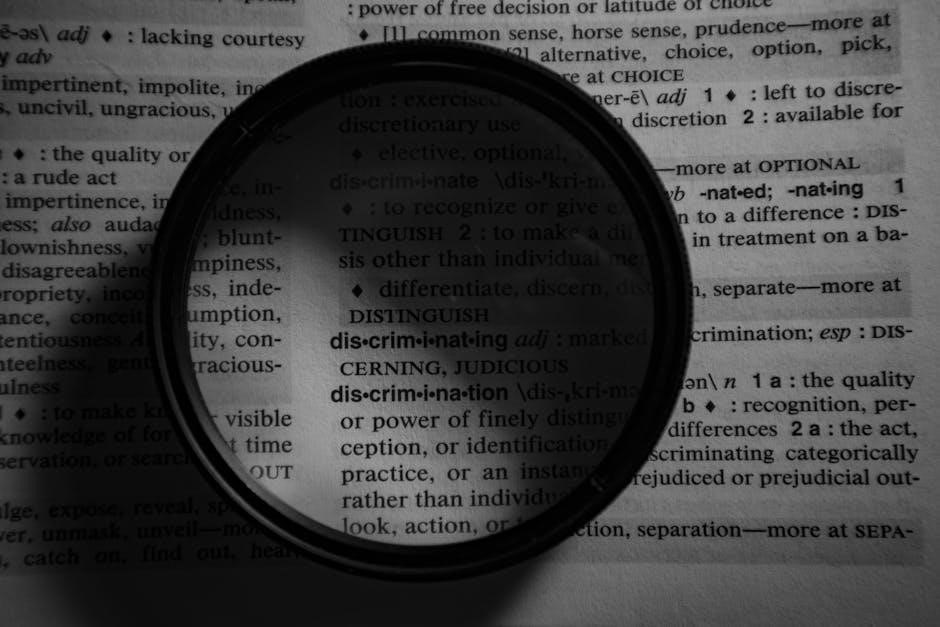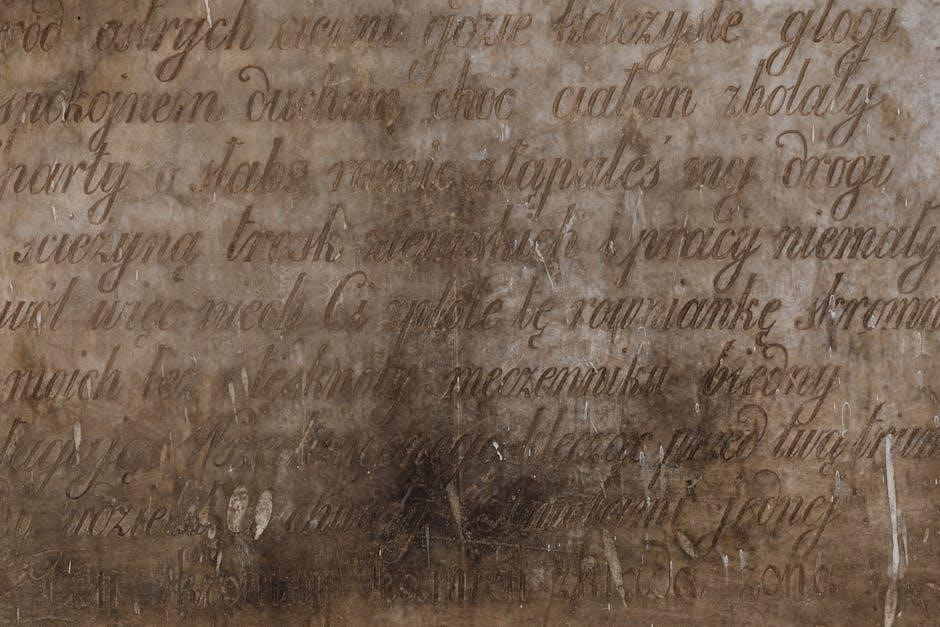A character reference letter for court is a document provided to judges to vouch for an individual’s moral standing, highlighting their positive traits and community contributions. Samples in PDF format are widely available online, offering templates that guide the structure and content of such letters, ensuring clarity and professionalism.
What is a Character Reference Letter?
A character reference letter is a formal document written to vouch for an individual’s moral standing, typically for legal purposes. It is submitted to a court to provide insight into the person’s positive traits, behavior, and contributions to society. This letter is usually authored by someone who has known the individual for a significant period, such as a friend, employer, or community leader. It highlights the person’s reliability, integrity, and good conduct, offering a personal perspective to help the court assess their character. The letter is not a legal document but a personal endorsement aimed at influencing the court’s decision-making process. Templates for character reference letters are widely available online, including PDF formats, to guide the structure and content effectively.
Importance of a Character Reference Letter in Legal Proceedings
A character reference letter holds significant importance in legal proceedings as it provides the court with a personal perspective on the defendant’s character. It highlights their positive traits, community contributions, and moral standing, which can influence the court’s decision-making. This letter can help dismiss or reduce charges, advocate for a more lenient sentence, or support alternatives to imprisonment. By showcasing the individual’s rehabilitation, remorse, and good conduct, it humanizes the defendant beyond the legal facts. Judges often consider such letters to gain a broader understanding of the person involved, making it a crucial tool in shaping a fair outcome. Its impact lies in balancing the legal framework with personal insights, offering a holistic view of the defendant’s character.

Structure of a Character Reference Letter
Character reference letters for court typically include header information, recipient’s address, greeting, introduction, body paragraphs highlighting the defendant’s character, and a conclusion with a sign-off.

Header Information: Your Details and Date

The header of a character reference letter should include your full name, address, phone number, and email at the top. The date should be written below your contact details, followed by a blank line before the recipient’s address. Including your information establishes credibility and allows the court to contact you if necessary. The date is essential for record-keeping purposes, ensuring the letter is timely and relevant to the case. Proper formatting, such as using a formal business letter style, is recommended to maintain professionalism. Templates often provide a clear structure for this section, guiding you to present your details neatly and clearly.
Recipient’s Address: Court and Judge Details
The recipient’s address section should include the full name and address of the court where the case is being heard, along with the judge’s name if available. This information ensures the letter is directed to the correct legal authority. The court’s address should be written formally, typically in the top left corner of the page, below your contact details. Including the judge’s name adds a personal touch and shows respect for the court. Proper formatting, such as using a formal business letter style, is crucial to maintain professionalism. Templates often include placeholders for this section, making it easier to insert the correct court and judge details. Accuracy in this section is vital to ensure the letter reaches the intended recipient.
Greeting: Proper Salutation for the Judge
The greeting in a character reference letter should be formal and respectful, as it is addressed to a judge or court official. Common salutations include “Dear Judge [Last Name]” or “To the Honorable Judge [Last Name].” If the judge’s name is unknown, “Dear Sir/Madam” or “To the Presiding Judge” is acceptable. The greeting sets the tone for the letter, so it must convey professionalism and courtesy. Proper titles such as “The Honorable” before the judge’s name are recommended to show respect for the court. Ensure the salutation is clear and free of errors, as it reflects the writer’s sincerity and attention to detail. Using the correct title and name of the judge is essential to maintain formality and professionalism.
The introduction of a character reference letter for court should clearly state the purpose of the letter and establish the writer’s relationship with the defendant. It is essential to mention how long you have known the individual and in what capacity, such as a friend, employer, or neighbor. This section should also explain why you are writing the letter and what qualities or attributes you intend to highlight about the person. Be concise and direct, ensuring the judge understands your connection to the defendant and the relevance of your testimony. Avoid unnecessary details and focus on setting a professional and sincere tone for the rest of the letter. Clarity and honesty are crucial in this opening section to establish credibility.
Body Paragraph 1: Relationship with the Defendant
In this paragraph, clearly describe your relationship with the defendant, including how long you have known them and the nature of your interactions. Mention how you met, such as through work, community activities, or personal connections, and highlight specific qualities you have observed over time. Be honest and straightforward, ensuring the judge understands your connection and the context of your knowledge about the defendant. Avoid emotional appeals and focus on factual observations that demonstrate their character. This section sets the foundation for your credibility and provides insight into the defendant’s personality and behavior, which is essential for the court to assess their case.
Body Paragraph 2: Positive Character Traits
Highlight the defendant’s positive character traits, such as honesty, responsibility, empathy, and kindness. Explain how these qualities have been evident in their actions and interactions with others. For example, if the defendant is known for volunteering or helping neighbors, mention these activities to illustrate their compassion and community spirit. Focus on traits that demonstrate their integrity and moral fiber, such as being a reliable friend, a dedicated worker, or a caring family member. Be specific about how these traits reflect their overall character and how they contribute positively to society. This section helps the court understand the defendant’s moral standing and potential for rehabilitation.
Body Paragraph 3: Specific Examples of Good Character

Provide specific examples that demonstrate the defendant’s good character, such as acts of kindness, community service, or personal achievements. For instance, describe how they volunteered at a local shelter, helped a neighbor in need, or excelled in their job while maintaining a strong moral compass. Include details about their behavior over time, showing consistency in their positive actions. Highlight instances where they took responsibility, showed empathy, or demonstrated integrity. These examples should be concrete and verifiable, offering the court a clear picture of the defendant’s character. Avoid vague statements and focus on real-life situations that illustrate their positive traits and contributions to society.
In the conclusion, summarize your key points and respectfully appeal to the court for leniency. Reaffirm your confidence in the defendant’s character and express hope for a positive outcome. Acknowledge the seriousness of the situation while emphasizing their potential for rehabilitation and contribution to society. End with a polite request for the court to consider your letter and the defendant’s good character when making its decision. Keep the tone sincere and respectful, ensuring your final remarks leave a positive impression on the judge.
Sign-Off: Closing Remarks and Signature
The sign-off section is the final part of the character reference letter, where you conclude your remarks and provide your contact information. End with a polite closing such as “Sincerely” or “Respectfully,” followed by your full name, signature (if submitting a hard copy), and contact details. This ensures the court can verify the letter’s authenticity if needed. Keep the tone professional and respectful, avoiding any overly casual language. The signature is a critical element, as it validates your endorsement of the defendant’s character. Ensure all information is legible and accurately presented to maintain the letter’s credibility and impact.

Writing Tips for an Effective Character Reference Letter
Be honest, use formal language, and include specific examples to highlight the defendant’s positive traits. Avoid legal jargon and focus on their character, ensuring the letter is clear and respectful.
Using Formal Language and Proper Tone
When writing a character reference letter for court, it is crucial to use formal language and maintain a proper tone. Avoid slang, casual phrases, or overly emotional language, as this can detract from the letter’s credibility. Address the judge respectfully, using titles such as “Your Honor” or “Dear [Judge’s Name].” Ensure the tone is sincere, objective, and professional, reflecting the gravity of the legal context. The letter should be clear, concise, and free of grammatical errors to convey respect for the court and the defendant. A well-crafted tone helps establish credibility and ensures the letter is taken seriously by the court.
Being Honest and Objective
When writing a character reference letter for court, honesty and objectivity are essential. The letter must accurately reflect the defendant’s character and actions without exaggeration or bias. Avoid making false claims or withholding relevant information, as this can harm credibility. It is important to provide specific examples of the defendant’s positive behavior and how they have demonstrated responsibility or remorse. Avoid overly emotional language or one-sided perspectives, as the court seeks a balanced view. Being truthful and objective ensures the letter is taken seriously and helps the court assess the defendant’s character fairly. Honesty builds trust, while objectivity ensures the letter remains credible and impactful.
Providing Specific Examples
Including specific examples in a character reference letter strengthens its impact and credibility. Instead of general statements, highlight concrete instances of the defendant’s positive behavior, such as volunteer work, community involvement, or acts of kindness. For example, describe how they helped a neighbor in need or consistently demonstrated responsibility in their job. These examples should illustrate the defendant’s good character and capacity for positive contributions. Avoid vague claims and focus on verifiable actions that showcase their integrity, empathy, or commitment to improvement. Specific examples make the letter more persuasive, as they provide tangible evidence of the defendant’s qualities for the court to consider.
Highlighting Rehabilitation and Remorse
When writing a character reference letter, it’s essential to highlight the defendant’s efforts toward rehabilitation and express genuine remorse for their actions. This demonstrates a willingness to take responsibility and change behavior. Mention any counseling, therapy, or community service the defendant has undertaken to address their mistakes. Additionally, include examples of how they have made amends or positively contributed to their community. Emphasize their commitment to personal growth and adherence to lawful behavior. This section should convey sincerity and a clear understanding of the consequences of their actions, reinforcing the court’s confidence in their ability to reintegrate as a responsible individual.
Avoiding Legal Jargon
Avoiding legal jargon in a character reference letter ensures clarity and effectiveness. Judges appreciate straightforward, concise language that conveys sincere thoughts without unnecessary complexity. Using plain language helps the court understand your perspective without confusion. Legal terminology can often alienate or obscure the genuine intent of the letter. Instead, focus on clear, heartfelt expressions of your observations and beliefs about the defendant. This approach makes the letter more relatable and impactful, allowing the court to focus on the defendant’s character and circumstances rather than deciphering complex terms. By keeping the language simple and direct, you enhance the letter’s credibility and ensure your message is clearly conveyed.

Sample Character Reference Letter for Court
Sample character reference letters for court are readily available online in PDF format, offering templates that guide the structure and content, ensuring professionalism and clarity in presentation.
Example of a Personal Character Reference
A personal character reference letter is written by someone who knows the defendant well, such as a family member, friend, or neighbor. It should include the writer’s relationship to the defendant, the duration of that relationship, and personal observations of the defendant’s character. For example, the letter might describe the defendant’s honesty, kindness, or commitment to their community. Specific examples, such as volunteering or helping others, can strengthen the letter. The tone should be sincere and heartfelt, avoiding exaggeration. The writer should also express confidence in the defendant’s ability to contribute positively to society. This type of letter helps humanize the defendant and provides the court with a well-rounded perspective.
Example of a Professional Character Reference
A professional character reference letter is typically written by a supervisor, colleague, or professional acquaintance who can attest to the defendant’s work ethic, reliability, and integrity. The letter should include the writer’s job title, the length of the professional relationship, and specific examples of the defendant’s positive qualities in a work or professional context. For instance, it might highlight their dedication, accountability, or ability to work well with others. The tone should remain formal and objective, focusing on observable behaviors and professional attributes. This type of letter helps demonstrate the defendant’s responsible nature and commitment to upholding ethical standards, providing the court with a perspective on their behavior in a structured, professional setting.
Downloadable PDF Templates
Downloadable PDF templates for character reference letters provide a structured format to ensure clarity and professionalism. These templates are widely available online and can be easily customized to suit specific needs. Many legal aid websites and professional resources offer free templates that guide users through the essential sections, such as the writer’s contact information, the defendant’s details, and the body of the letter. They often include placeholders for personal anecdotes and specific examples of the defendant’s positive character traits. Using a PDF template helps ensure the letter adheres to legal standards and presents the information in a clear, organized manner. This makes the process of writing a character reference letter more straightforward and efficient.
Legal Considerations
A character reference letter must comply with legal standards, ensuring honesty and objectivity. It should avoid jargon, include specific examples, and adhere to court submission guidelines.
Understanding the Purpose of the Letter
The primary purpose of a character reference letter is to provide the court with an honest and objective assessment of the defendant’s character, highlighting their positive traits, contributions to society, and potential for rehabilitation. It is not intended to argue the legal merits of the case but rather to offer context that may influence sentencing decisions. The letter should emphasize the writer’s personal knowledge of the defendant, their relationship, and specific examples of good character. It is crucial to avoid exaggeration or misinformation, as the letter’s credibility is paramount. The purpose is to humanize the defendant and demonstrate their capacity for positive change, ensuring the court considers a well-rounded perspective during legal proceedings.
Who Can Write a Character Reference Letter
A character reference letter can be written by individuals who have a genuine and longstanding relationship with the defendant, such as family members, close friends, colleagues, or community leaders. The writer should be able to provide an honest and objective assessment of the defendant’s character, highlighting their positive qualities and contributions to society. It is important that the writer is not directly involved in the case or have a conflict of interest, as this could compromise the letter’s credibility; Employers, educators, or religious leaders are also suitable candidates, as they can attest to the defendant’s work ethic, moral fiber, and community involvement. The writer’s credibility and relationship with the defendant are critical to the letter’s effectiveness in court.
What to Include and Avoid
When crafting a character reference letter for court, it is essential to include specific details about the defendant’s positive traits, such as honesty, responsibility, and community involvement.Provide concrete examples of their good behavior, such as volunteering or helping others, to demonstrate their character. Expressing remorse for their actions, if applicable, can also be beneficial. However, avoid making false or exaggerated claims, as this can undermine credibility. Do not discuss the case details or express opinions on guilt or innocence. Additionally, refrain from using informal language or emotional appeals, as the letter should remain professional and objective. Ensuring the letter is truthful and focused on the defendant’s positive qualities will make it more impactful and credible to the court.
Submission Guidelines for the Court
Character reference letters must adhere to specific submission guidelines to ensure they are accepted by the court. Letters should be typed on proper letterhead, including the author’s contact information, and dated. Submit the letter well in advance of the court date to allow time for review. Ensure the document is signed and notarized if required by the court. Avoid submitting handwritten letters, as they may appear unprofessional. Check with the court for any specific formatting or content requirements. Submit multiple copies if requested, and retain a copy for personal records. Professional presentation and adherence to these guidelines enhance the letter’s credibility and effectiveness in legal proceedings.

Additional Resources
Find sample character reference letters and templates online, along with legal guides and tips for writing effective letters. Websites like LawHelp.org and legal aid services offer additional support.
Where to Find Sample Letters Online
Sample character reference letters for court can be easily found online through legal aid websites, templates, and professional services. Websites like LawHelp.org and legal aid platforms offer downloadable PDF templates tailored for court use. Additionally, many law firms and legal resource websites provide free samples and guides to assist individuals in drafting effective letters. These resources often include step-by-step instructions and examples to ensure clarity and professionalism. Utilizing these templates helps ensure the letter meets legal standards and effectively communicates the individual’s character to the court. Always verify the credibility of the source to ensure the sample aligns with legal requirements.
Legal Aid and Consultation Services
Legal aid organizations and consultation services are invaluable resources for individuals needing assistance with character reference letters. Many legal aid websites offer free templates and guidance, ensuring letters meet court standards. These services often provide one-on-one consultations to help individuals understand what to include and avoid in their letters. Professional legal advisors can also review drafts to ensure clarity and effectiveness. Additionally, some firms specialize in criminal law and offer tailored advice for character references. Utilizing these services can significantly improve the quality and impact of the letter, especially for those unfamiliar with legal procedures. Consulting a legal professional is highly recommended for complex cases or specific requirements.

Guides for Writing Effective Letters
Guides for writing effective character reference letters are widely available online, offering step-by-step instructions and expert tips. These resources often include advice on tone, structure, and content, ensuring the letter is both professional and impactful. Many guides emphasize the importance of honesty, clarity, and specificity, while also providing examples of phrases and sentences to use. Additionally, they may cover common pitfalls to avoid, such as using overly emotional language or including irrelevant details. Some guides also offer downloadable templates that can be customized to fit individual circumstances. By following these guides, individuals can create letters that effectively convey the defendant’s positive qualities and strengthen their case in court.
A well-crafted character reference letter can significantly impact court proceedings, offering a personal perspective on the defendant’s character. Ensure sincerity and adherence to guidelines for maximum effectiveness.
Final Thoughts on Writing a Character Reference Letter

Writing a character reference letter for court is a serious responsibility that requires sincerity and clarity. The letter should reflect the writer’s honest opinion of the defendant’s character, emphasizing their positive qualities and contributions to society. It is crucial to maintain a professional tone while providing specific examples to support the claims made. The letter’s impact lies in its ability to humanize the defendant and demonstrate their potential for rehabilitation. By following proper structure and guidelines, a well-crafted character reference letter can make a significant difference in court proceedings. Always ensure the letter is tailored to the specific case and adheres to legal standards for maximum effectiveness.
Encouragement to Seek Professional Help if Needed
Seeking professional assistance when writing a character reference letter for court can significantly enhance its effectiveness. Legal professionals or experienced writers can provide valuable insights and ensure the letter adheres to court standards. If unsure about the proper format, tone, or content, consulting a legal expert or using downloadable PDF templates can guide you through the process. Professional help ensures the letter is clear, concise, and impactful, avoiding common mistakes that could diminish its credibility. By seeking assistance, you can confidently submit a letter that effectively supports the defendant and positively influences the court’s perception of their character.
